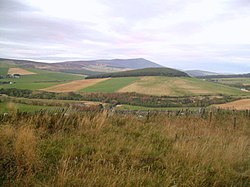Battle of Glenlivet
| Battle of Glenlivet | |||||||
|---|---|---|---|---|---|---|---|
 Glenlivet |
|||||||
|
|||||||
| Belligerents | |||||||
| Clan Gordon, Clan Hay, Clan Comyn, Clan Cameron | Clan Campbell, Clan Murray, Clan Stewart, Clan Forbes, Clan Macgillivray, Clan Maclean, Clan Grant, Clan MacNeil, Chattan Confederation - Clan Mackintosh. | ||||||
| Commanders and leaders | |||||||
|
George Gordon, 1st Marquess of Huntly Francis Hay, 9th Earl of Erroll |
Archibald Campbell, 7th Earl of Argyll | ||||||
| Strength | |||||||
| 2,000 | 10,000 | ||||||
| Casualties and losses | |||||||
| 14 | 500 | ||||||
The Battle of Glenlivet was fought on 3 October 1594 near Allanreid and Morinsh in Scotland.
This battle is often seen as a religious conflict, and was fought by the Catholic forces of George Gordon, 1st Marquess of Huntly and Francis Hay, 9th Earl of Erroll, who were victorious over the Protestant forces of Archibald Campbell, 7th Earl of Argyll. When the decree of 12 November 1593 came out, by which Catholics were ordered to give up their faith or leave the country, Huntly refused to obey. His continued resistance culminated in the Battle of Glenlivet, where, accompanied by the Earl of Erroll, he engaged Argyll's army above Allt a' Choileachain.
The Earl of Huntly's forces consisted of 2,000 Highlanders from Clan Gordon, Clan Hay, Clan Comyn, Clan Cameron, Clan Cumming.
The Earl of Argyll's forces consisted of 10,000 Highlanders from Clan Campbell, Clan Murray, Clan Stewart, Clan Forbes, Clan Macgillivray, Clan Maclean, Clan Grant, and the Chattan Confederation of Clan Mackintosh.
Huntly's retainers prepared for battle by confession and communion. Mass was said at Auchindoun for them by Father James Gordon, S.J., before they set out on their march through Glenrinnes. Their weapons were sprinkled with holy water, and a cross placed on their armour symbolised that they fought in defence of the Cross of Christ.
The Earl of Huntly's force of 2,000 men routed the Earl of Argyll's force of 10,000. Huntly's victory was a dramatic victory of horse and artillery over irregular infantry.
...
Wikipedia
